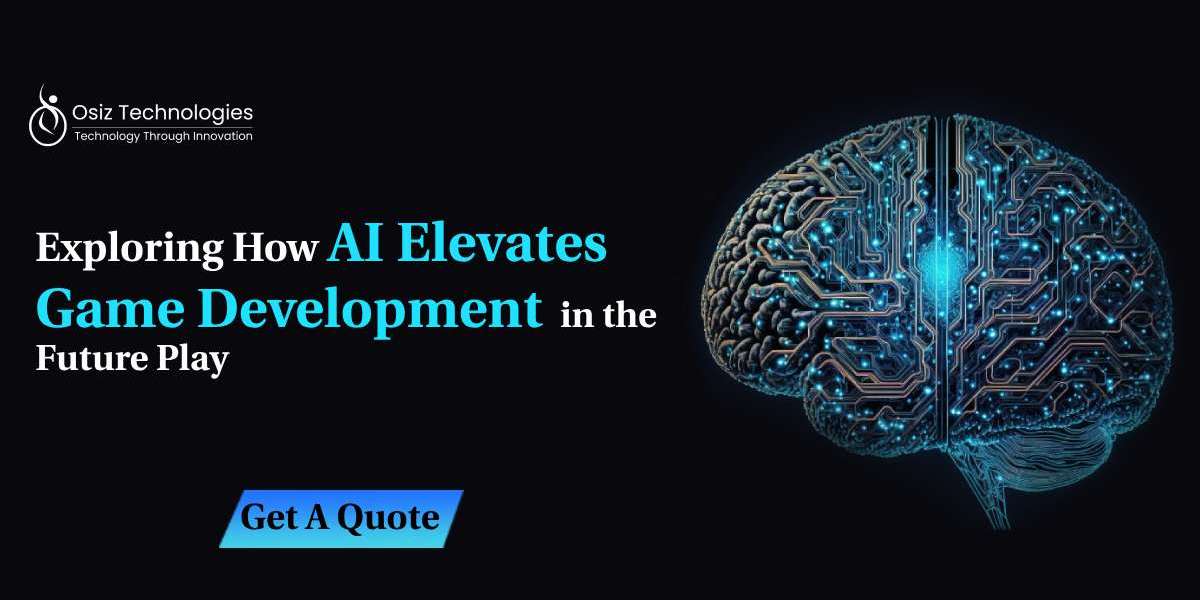The Future Play promises personalized gaming experiences, adaptive storytelling, and graphics enhanced by AI-generated elements. This exploration unravels the tapestry of possibilities where AI becomes the driving force behind the evolution of game development, unlocking new dimensions and pushing the boundaries of what is conceivable in the realms of digital entertainment.
In the realm of gaming, the combination of Artificial Intelligence (AI) and game development is propelling the industry into a future of unparalleled innovation. The symbiotic relationship between AI and game development is transforming the way games are conceptualized, designed, and experienced. AI is not merely a tool; it is a dynamic force that elevates the very essence of gameplay. As we embark on this exploration, we delve into the ways AI reshapes the future play.
How Does AI Plays A Major Role In Gaming Platforms?
AI plays a pivotal role in shaping the landscape of gaming platforms, contributing to enhanced user experiences, dynamic gameplay, and innovative features. Several key areas showcase the significant impact of AI in the gaming industry:
Intelligent NPCs and Adversaries:
AI drives the development of lifelike non-player characters (NPCs) and adversaries in games. These entities adapt to player actions, learn from interactions, and enhance the gaming experience by offering a more challenging and immersive environment.
Adaptive Gameplay:
AI algorithms analyze player behavior, dynamically adjusting gameplay to ensure an engaging and personalized experience for each player.
Procedural Content Generation:
AI-driven procedural content generation adds randomness to in-game content, crafting diverse environments, quests, and challenges. This ensures each gaming session feels unique, providing novel experiences for players.
Personalized User Experiences:
Using machine learning, AI personalizes gaming experiences by recommending content and adjusting difficulty levels based on individual skills, catering to each player's preferences and abilities.
Predictive Analytics for Player Retention:
AI analyzes player data to predict behavior, preferences, and potential churn, empowering gaming platforms to enhance player retention through strategic engagement and targeted content recommendations.
Dynamic Storytelling:
AI contributes to dynamic storytelling by adapting narratives based on player choices. This branching narrative approach allows players to influence the progression of the story, fostering a sense of agency and immersion within the game world.
Game Testing and Quality Assurance:
AI streamlines game testing and quality assurance processes. Automated testing using AI algorithms identifies bugs, inconsistencies, and potential issues more efficiently, ensuring a higher standard of quality in game releases.
Virtual Assistants and In-Game Guidance:
AI-powered virtual assistants provide real-time guidance within games. These assistants analyze player actions, offer strategic advice, and enhance the overall gaming experience by providing assistance and insights when needed.
Anti-Cheating Measures:
AI is instrumental in detecting and preventing cheating in online multiplayer games. Through behavioral analysis and pattern recognition, AI algorithms identify suspicious activities, maintaining fair play and the integrity of the gaming environment.
Enhanced Graphics and Visuals:
AI contributes to the improvement of graphics and visuals in games. From realistic textures to advanced rendering techniques, AI enhances the visual fidelity of gaming platforms, delivering visually stunning and immersive experiences.
The Impact Of AI On Game Development
The impact of AI on game development is profound, revolutionizing the industry in unprecedented ways. Artificial Intelligence has become a driving force behind the creation of more immersive, dynamic, and intelligent gaming experiences. From crafting lifelike non-player characters (NPCs) to adapting gameplay based on player behavior, AI introduces a level of sophistication that redefines the boundaries of interactive entertainment. Procedural content generation ensures diverse and unpredictable in-game environments, while personalization tailors gaming experiences to individual preferences. As AI continues to evolve, it not only enhances the technical aspects of game development but also shapes the future of storytelling, user engagement, and overall innovation within the gaming landscape.
Innovations in AI gaming trends
Innovations in AI gaming trends are shaping the future of the gaming industry. Artificial Intelligence has introduced transformative advancements that go beyond traditional gaming experiences.
Lifelike NPCs and Adaptive Behaviors:
Introduction of intelligent non-player characters with lifelike behaviors.
NPCs adapt dynamically to player actions, enhancing immersion and challenge.
Procedural Content Generation:
AI-driven generation of diverse in-game environments, quests, and challenges.
Ensures each gaming session feels unique, offering unpredictable and engaging experiences.
Personalized Gaming Experiences:
AI analyzes player behavior for tailored gaming experiences.
Personalization includes content recommendations and adaptive difficulty levels.
Predictive Analytics for Player Retention:
AI utilizes predictive analytics to anticipate player behavior and preferences.
Empowers gaming platforms with insights for strategic player retention and targeted content recommendations.
Virtual Assistants in Gaming:
Integration of AI-powered virtual assistants within games.
Real-time guidance, strategic advice, and enhanced player support contribute to a more immersive gaming environment.
Ethics of AI in Gaming
Navigating these ethical considerations requires a thoughtful and collaborative approach from game developers, industry stakeholders, and the gaming community to foster an environment where AI enhances gaming experiences responsibly and ethically.
Player Privacy and Data Security:
Ethical concerns arise regarding the collection and use of player data by AI-driven gaming systems. Ensuring robust data security measures and respecting player privacy are imperative to maintain trust and safeguard sensitive information.
Algorithmic Bias and Fair Play:
AI algorithms can unintentionally introduce biases in gameplay and decision-making. Ethical considerations involve addressing algorithmic fairness to ensure equal opportunities for all players, regardless of demographic factors.
Transparency in AI Decision-Making:
Ethical transparency is essential in revealing how AI algorithms make decisions that impact gameplay. Players should have insights into the decision-making process to understand and trust the AI systems operating within the gaming environment.
Inclusivity and Representation:
Ethical considerations involve ensuring that AI-driven content creation is inclusive and represents diverse demographics accurately. Avoiding stereotypes and fostering diverse representation within the virtual world contribute to an ethical gaming environment.
Addiction and Gaming Behavior:
Ethical concerns revolve around the potential for AI to optimize gaming experiences in ways that encourage excessive engagement and addiction.
Striking a balance between engaging gameplay and player well-being is crucial to address potential negative impacts on mental health.
A List Of Popular AI-Based Games
The AI in video games is typically designed to be easy to use by creators. Not many game developers take the risk and try to wow their audience by creating software that does more than just run, hide, and explode.
Naturally, every player has their favorite titles, but these are the ones that everyone agrees to provide something fresh in the field of artificial intelligence.
The Top Games With Artificial Intelligence Include These Ones:
- F.E.A.R
- AlphaGo Zero
- Darkforest
- Minecraft
- Rocket League
- Middle Earth: Shadow Of Mordor
- Red Dead Redemption 2
- Half-Life
- Grand Theft Auto 5
- Halo: Combat Evolved
Which AI Techniques Are Applied In Games?
These AI techniques collectively contribute to creating immersive, dynamic, and challenging gaming experiences, showcasing the versatility and evolving nature of artificial intelligence in the gaming industry.
Pathfinding Algorithms:
Objective:
Determine the best route for characters or entities to navigate game environments.
Application:
Ensures efficient movement and realistic exploration by calculating optimal paths through complex terrains.
Behavior Trees:
Objective: Model hierarchical structures for defining NPC behavior through sequences of tasks and decisions.
Application:
Enables dynamic and context-aware behaviors for non-player characters, contributing to realistic and diverse interactions.
Neural Networks:
Objective:
Employ machine learning techniques for various applications, including character animation, dialogue systems, and opponent AI.
Application:
Enhances realism by enabling characters to learn and adapt based on experiences, providing more nuanced and unpredictable interactions.
Reinforcement Learning:
Objective:
Enable AI agents to learn optimal strategies through trial and error, adapting behavior based on rewards and penalties.
Application:
Enhances adaptive gameplay, allowing AI opponents to improve and challenge players over time.
Dynamic Difficulty Adjustment (DDA):
Objective: Modify game difficulty in real-time based on player performance to maintain an enjoyable and challenging experience.
Application:
Provides personalized gaming experiences, ensuring that players face appropriate levels of difficulty tailored to their skill and progress.
Unlock Gaming Potential: Choose Osiz for Next-Gen AI Solutions
In conclusion, Osiz Technologies stands out as a preeminent force in the realm of artificial intelligence development and game development platforms. With a commitment to innovation, cutting-edge technologies, and a proven track record, Osiz emerges as a leader in the industry. Their expertise in AI development reflects a dedication to creating intelligent and adaptive solutions, while their prowess in game development positions them as a frontrunner in crafting immersive and engaging gaming experiences. As a company at the forefront of both AI and game development, Osiz Technologies not only excels in delivering advanced solutions but also consistently sets industry standards, making them the preferred choice for those seeking unparalleled expertise and innovation in these dynamic fields.
Crafting Tomorrow's Games Today-Empower Your Vision with AI!
Osiz Technologies stands out as a premier blockchain development company, renowned for its excellence in crafting innovative solutions that transcend traditional boundaries. Specializing in a wide array of cutting-edge services, Osiz Technologies is at the forefront of the industry, offering unparalleled expertise in blockchain development, Web3 development, cryptocurrency exchange development, metaverse development, and generative AI development. With a commitment to pushing the boundaries of technology, Osiz Technologies not only meets but exceeds the evolving needs of its clients, providing them with bespoke solutions that harness the power of blockchain and emerging technologies. The company's dedication to quality, creativity, and client satisfaction cements its position as a leader in the dynamic landscape of blockchain and beyond.
Source:
https://www.osiztechnologies.com/blog/ai-in-game-development
For Business Proposal:
Call/Whatsapp: +91 9442164852
Telegram: Osiz_Tech
Skype: Osiz.tech
Email: [email protected]









